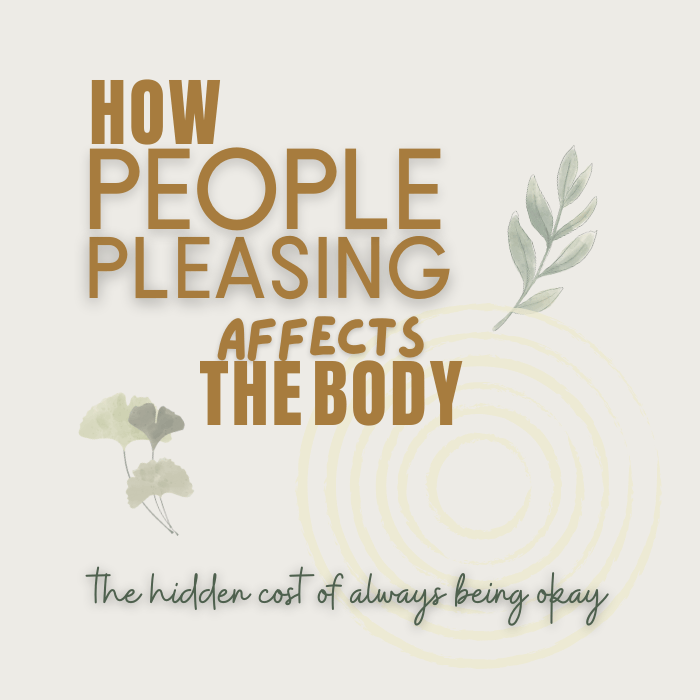(The Hidden Cost of Always Being “Okay”… let’s explore how people pleasing affects the body)
On the outside, people pleasing can look calm.
Easygoing. Flexible. Kind.
But on the inside — especially inside the body — something very different is often happening.
Tension. Tightness. Numbness. Exhaustion.
Because people pleasing isn’t just an emotional habit.
It’s a full-body response — one that shapes your posture, your breath, your nervous system rhythms.
Let’s gently explore how people pleasing affects the body — and how your system might begin to soften out of them, at a pace that feels kind.
Some links on this page are affiliate links. If you choose to purchase through them, it supports this site at no extra cost to you. Thank you for your support. 🤍
1. Chronic Tension and Muscle Holding
Saying yes when you mean no, smiling when you’re shrinking, pushing through discomfort — these choices may seem small, but they carry physical consequences.
Over time, many people pleasers develop:
- Tight jaw or throat
- Stiff shoulders and upper back
- Shallow chest breathing
- Clenched gut or pelvic floor
Your body holds what your voice couldn’t say.
And often, it’s been holding it for years.
2. Disconnection From the Body’s Signals
People pleasing pulls your attention outward — constantly scanning for how others feel, what they need, what they expect.
In the process, you may lose touch with your own:
- Hunger
- Fatigue
- Emotional cues
- Need for rest or space
This disconnection is a form of self-abandonment — not chosen consciously, but created for survival.
🤍 You can begin to rebuild connection gently with this guide: The Body’s Signals — a soft invitation to come back inward.
3. Nervous System Freeze and Shutdown
When your body doesn’t feel safe to say no, express needs, or take up space — it may go into freeze.
This can look like:
- Feeling foggy or spaced out
- Going numb during conflict
- Smiling or agreeing while feeling frozen
- Wanting to respond but feeling like you can’t
Freeze isn’t weakness. It’s your nervous system’s way of protecting you from what once felt overwhelming.
🌿 Explore the Freeze Response to better understand how this shows up — and why your system may still rely on it.
If you’d like to explore how fawning — the deeper pattern beneath many people-pleasing habits — impacts the body, this somatic guide from The Embody Lab is a soft and validating place to begin.
4. Hypervigilance and Over-Tracking
People pleasers often become emotionally hyper-attuned to others.
You might feel every shift in someone’s tone, body language, or facial expression.
This constant tracking can leave your body in a near-constant state of:
- Subtle anxiety
- Tight belly
- Tense shoulders
- Difficulty relaxing — even when “nothing’s wrong”
It’s not in your head.
It’s in your body — which has learned to scan for safety by managing others’ states.
5. Somatic Burnout and Emotional Exhaustion
Over time, the physical impact of people pleasing compounds.
You may find yourself:
- Easily overwhelmed
- Craving solitude but feeling guilty for it
- Emotionally flattened or numb
- Over-caring but under-supported
This is what happens when your system gives and gives, without receiving or resting.
It’s not a moral failure — it’s nervous system depletion 🪷
What Helps: Gentle Reconnection and Release
You don’t need to force your body to soften.
You only need to begin offering it new options.
Try:
- Grounding before replying to a request
- Breathing into your belly before you speak
- Noticing your jaw and shoulders when in people-pleasing mode
- Touching your own body gently when you feel unseen or hyperaware of others
Most of all: pause, and return inward. Even for a moment.
Your body is listening.
If your body has carried the weight of people pleasing, these two resources may gently support you — not to push, but to reconnect.
• The Vagus Nerve Deck
A gentle tool to help you come back into your body. Each card offers a small practice to support nervous system regulation and emotional release — especially helpful when you feel numb or on edge.
• Set Boundaries, Find Peace by Nedra Glover Tawwab
An honest, grounded guide to boundary-setting — perfect for recovering people pleasers ready to honor their needs without guilt.
Softening these patterns doesn’t happen overnight. But your body is listening. Every moment of care makes a difference.
🌿 FAQ: The Somatic Side of People Pleasing
Q: Why do I feel tense even when I’m being “nice”?
A: Because often, “nice” is masking fear. Your body may be tightening in response to a perceived lack of safety — even if your words are calm.
Q: Can these patterns change through body-based work?
A: Yes. Somatic practices can help your system begin to feel safe choosing something different — not just thinking about it.
Q: What if I feel numb instead of tense?
A: Numbness is common. It’s a form of freeze — a protective disconnect. That’s why this work is slow and tender, focused on restoring trust and sensation.
Your unfolding is already underway — and it’s beautiful.

